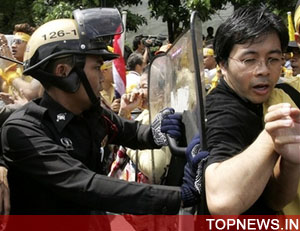Demonstration delays launch of new Thai cabinet
 Bangkok - Thousands of anti-government demonstrators Monday delayed the launch of Thailand's new cabinet by surrounding Parliament Building in Bangkok, barring legislators from entering the premises in the morning.
Bangkok - Thousands of anti-government demonstrators Monday delayed the launch of Thailand's new cabinet by surrounding Parliament Building in Bangkok, barring legislators from entering the premises in the morning.
Thailand's new Prime Minister Abhisit Vejjajiva was forced to delay the delivery of his cabinet's policy statement, a necessary requirement for launching a new administration.
It was unclear whether the session could be opened later in the day, or if the protest would force postponement until after the new year.
About 4,000 members of the Democratic Alliance Against Dictatorship (DDAD), surrounded Parliament Building early Monday morning to prevent legislators from entering the building.
"Whatever the government decides to do, we will stay here for three days," said Jakrapob Penkair, a key leader of the DAAD.
The "red shirts" of the DAAD are the counterpart to the "yellow shirts," or followers of the People's Alliance for Democracy (PAD), which toppled the last government.
In laying siege to Parliament, the DAAD has imitated the tactics of the PAD, which tried to block the former coalition government under ex-premier Somchai Wongsawat from launching its administration by staging a mass rally outside Parliament on October 7, blocking legislators from entering the building.
The PAD protest prompted a police crackdown in which two demonstrators died, but did not prevent the policy statement from being read.
The PAD, a loose coalition of forces adamantly opposed to the return to power of coup-ousted former premier Thaksin Shinawatra, finally succeeded in toppling Somchai's government after occupying Bangkok's two airports between November 26 to December 3.
After Somchai's fall, a new coalition government was formed under Abhisit, leader of the former opposition Democrat Party, last month.
The "red shirts," led by a pro-Thaksin clique, claim Abhisit's coalition government lacks legitimacy, as the Democrats failed to win a majority in the December 23, 2007, general election and have allegedly been helped to power by the Thai military and the PAD.
The Democrats mustered enough seats to form a new coalition, largely because a faction once loyal to Thaksin from the former People Power Party (PPP) switched sides.
The disloyalty has irked many Thaksin fans, many of whom voted for the PPP in the last election on the belief that the party would bring Thaksin back to power.
"The member of parliament I voted for has turned in to a cobra," said Gaysorn Pompron, 68, a resident of Surin province who joined the protest on Monday.
"He has sold himself to the Democrats, who have no right to rule," Gaysorn said of her elected MP, who has joined the Democrat coalition.
After almost six months of political turmoil in Bangkok, many within Thailand's business community and the so-called political elite have welcomed the Abhisit-led government.
Privy Council President Prem Tinsulanonda on Sunday expressed confidence that Abhisit, who paid him a courtesy call earlier in the day, would unite the country and lead it out of crisis.
"I am glad to have the prime minister named Abhisit," said Prem.
The PAD enjoyed the moral support of many middle class Thais and the Bangkok-based elite - which protected them from harsher crackdowns by the military and the police. It remains to be seen if the pro-Thaksin DAAD will be granted similar immunity from law enforcement.
Thaksin, Thailand's prime minister between 2001 to 2006, was ousted by a military coup on charges of mass corruption and dividing the nation.
In October the Supreme Court for Political Office Holders found Thaksin guilty of abuse of power for allowing his wife to bid on a plot of prime Bangkok land in a government auction in 2003. He has been sentenced in absentia to two years in prison.
Thaksin, a billionaire former telecommunications tycoon who endeared himself to a large section of Thailand's poor by introducing populist policies to the country, is living in self-exile. (dpa)